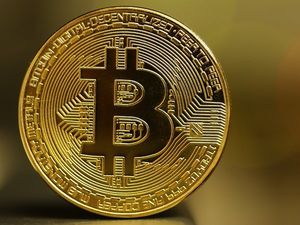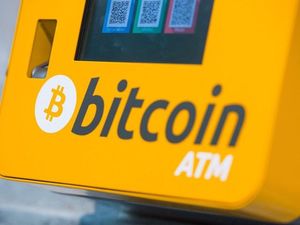Cryptocurrencies: Money of the future, or a bubble set to burst?
Almost exactly 301 years ago to the day, the semi-nationalised South Sea company sold its first shares to the public.

Aside from being morally reprehensible – its main line of business was exporting slaves to South America – the company was also spectacularly unprofitable, mainly due to the fact that war with Spain made the prospect of actually doing any trade near-impossible.
Yet when it was floated on the stock exchange in 1720, its shares sold like hot cakes, in no small part due to the fact that investors only had to pay 20 per cent of the share price up front, the rest being paid in instalments. Stock valued at £2 million was sold within one hour.
For a brief while the share price rocketed. People piled in to buy shares on the never-never in a company which wasn't actually doing any business, and a few people made a quick killing. Then the bubble burst, leaving investors with a pile of debt on shares barely worth the paper they were written on. The British economy nosedived, and millions were left to pay the price.
The moral is, of course, that there are always people who are prepared to take exceptional risks in the search of exceptional rewards. While South Sea's balance sheet might not have been much to write home about, for a brief time people were making money out of buying and selling shares in a company with little in the way of tangible assets.
Last week, on the anniversary of what became known as the South Sea Bubble, the cryptocurrency trading platform Coinbase was floated on the Nasdaq stock exchange with an eye-watering valuation of 100 billion US dollars, sparking an immediate comparison by the financial journalist Patrick Young.
Over the past 10 years, cryptocurrencies have become big business. Most people will have seen online adverts promising how untold fortunes can be made from Bitcoin, and survey published last week suggested that 14 per cent of people in the West Midlands had bought into a cryptocurrency of some kind. The same survey also reported that 28 per cent of people in the region placed Bitcoin in their top three preferred investments, ahead of property and only slightly behind gold.
But are cryptocurrencies a bona fide investment opportunity, or as Young suggests, just another get-rich-quick fad which will leave people poorer once the novelty wears off?
It depends a lot on who you talk to.
The basic principle behind cryptocurrencies is straightforward enough. As the growth of the internet has seen a rise in global trade, a number of entrepreneurs spotted the opportunity for a worldwide currency which would not be subject to fluctations in exchange rate like domestic currencies. And since it is only used for digital transactions, they exist purely in digital form, with no need for notes and coins.

In the case of Bitcoin, in order to retain its intrinsic value, the number of 'coins' in circulation is restricted by a central computer system, although it is possible to 'mine' for new coins by completing a long list of very complex mathematical equations. This has led to a Bitcoin 'mining' industry, where huge banks of computers are set up to try do crack the Bitcoin code, and generate new coins. In one particularly notorious incident in 2018, a Bitcoin 'farm' caused extensive damage to a tower block in Vladivostok.
But unlike traditional currencies, cryptocurrencies are not subject to Government control or regulation, leading to the all-party Treasury committee likening the sector to the Wild West in 2018.
But given that they are not based in any one country, or tied to any single government, it is pretty near impossible to regulate them, short of banning their use as some countries have already done.
Bank of England governor Andrew Bailey recently said he was “very nervous” about people using bitcoin for payments. He has previously warned that cryptocurrency investors should be prepared to “lose all their money”.
Despite these fears, Bitcoin has been growing steadily since September, when money transfer service Paypal announced US customers would be able to trade the currency within its phone app next year. Electronics giant Tesla sent the currency surging in February when it bought £1 billion worth, and said it would accept the currency as payment for its electric cars.
There are plenty of people who have made money out of Bitcoin, but also plenty who have lost heavily. If you had invested at the start of 2020, you would have made 300 per cent profit by the end of the year, compared to a loss of 16 per cent on the FTSE 100. However, if you had done the same in 2018, you would have lost 73 per cent of your money over the course of the year as the bitcoin price collapsed. In 2017, the price of a Bitcoin fell by one third in a single day.
Despite this volatility, there is a growing number of first-time investors who have been turning to Bitcoin since the start of the coronavirus pandemic. Many of these are younger people who, having saved on travel costs and spending on socialising during the lockdown, have a bit more spare cash to play with. Frustrated with low interest rates on savings, they have looked elsewhere for returns.
Lewis Young is typical of this new generation. The 36-year-old self-employed electrician reckons he made £8,500 in one year from cryptocurrency trading, but says there have been plenty of highs and lows along the way.
He began with a £500 investment in Bitcoin in January 2019, working overtime on a construction site to fund his investment. He says he was aware of the risks when he started trading, but considered himself young enough to start again if he lost his money.
“Brexit put me off trying to get on the property ladder, and interest rates are so low," he says. "I decided to go into a market of the future, and digital currency is the future – no one will use cash.”
He admits there have been plenty of heart-stopping moments along the way.
“You can get caught up in the hype, buy something and then wake up the next morning and be $2,000 down. At one point my investments, which had risen a lot, fell back by $5,000 – I was like 'do I stay in or do I get it out?’. I held on and they went back up by $3,000 but then I took the money out because I thought I was up enough.”
Mark Steward, executive director of the Financial Conduct Authority, says cryptocurrencies do have a role to play in international transactions, and says the Government will look at how these can be harnessed.
But he says people should be in no doubt about the real risks attached to those investments.
"Anyone interested in cryptoassets should remember: promises of high profits mean high risks," he says.
"Only invest money that you can afford to lose."





